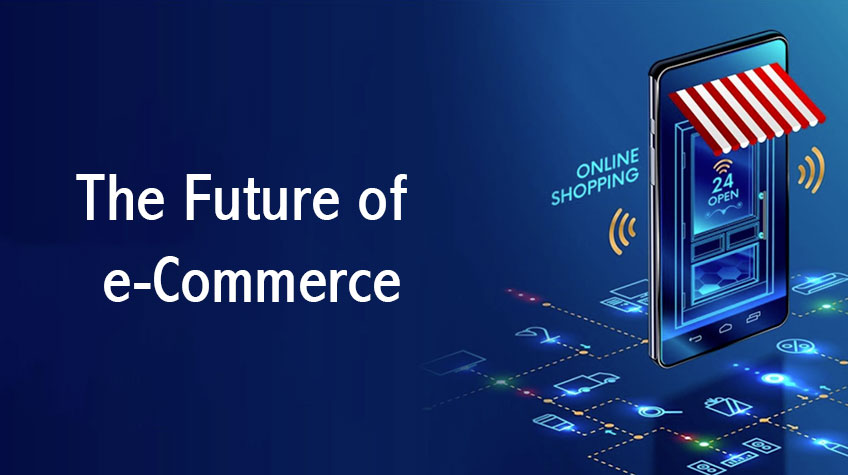- Home
- The Future Trends of E-Commerce and Online Shopping Experiences
The Future Trends of E-Commerce and Online Shopping Experiences
In recent years, e-commerce has grown unprecedentedly, fundamentally altering how we shop and completely disrupting the retail business. E-commerce is poised to experience significant growth in the coming years, creating exciting new opportunities for consumers and businesses.
This article delves into some of the emerging trends and technological advancements that will shape the future of e-commerce and the overall experience of shopping online. We will investigate how technology is reshaping how we find products online, interact with them, and buy them, including through personalized recommendations and immersive virtual experiences.
Personalization and Customer-Centric Experiences
Personalization of the shopping experience is where e-commerce is headed in the future. Businesses can better understand client preferences, behavior, and purchase history using artificial intelligence (AI) and machine learning (ML) algorithms because of the massive amounts of data already accessible.
Businesses can provide customers with more meaningful and interesting interactions when they tailor their product recommendations, individualize their marketing campaigns, and set their prices individually. Personalization can include more than just product recommendations; it can also include customized user interfaces, personalized content, and interactive features that adapt to each user's preferences.
Augmented Reality (AR) and Virtual Reality (VR)
Augmented reality (AR) and virtual reality (VR) technologies are poised to revolutionize the online shopping experience by closing the gap between the physical and virtual retail settings. AR enables customers to visualize products in their own space before purchasing. This enables customers to virtually try on clothes, test furniture placement, or see how a product fits in their home before purchasing.
On the other hand, virtual reality (VR) creates virtual stores and environments where customers can browse and interact with products, offering a more immersive shopping experience than traditional methods. These technologies improve engagement, reduce returns, and make shopping more like it is in real life.
Voice Commerce and Smart Assistants
As smart speakers and voice assistants become more integrated into our everyday lives, voice commerce is gaining traction as a viable business method. Users can now perform tasks such as searching for products, placing orders, and tracking delivery using voice commands. Voice commerce simplifies the buying process, making it more expedient and less time-consuming for consumers.
Voice assistants can now make personalized product recommendations, respond to customer questions, and help with product discovery thanks to natural language processing and artificial intelligence developments. To maintain a relevant presence in this developing trend, businesses should optimize their web platforms to be friendly to voice search and investigate the possibility of integrating with prominent voice assistants.
Seamless Cross-Channel Integration
Integration that is consistent across all available channels and points of contact is where e-commerce is headed in the future. When customers switch between devices and platforms, they anticipate having a seamless and unified experience across all those transitions. The goal of businesses should be to develop unified experiences in which a consumer may browse on a mobile device, then complete a purchase on a desktop computer, or go to a physical shop to purchase without any interruptions or difficulties.
Businesses can track customer journeys, personalize experiences, and provide a frictionless shopping experience across all touchpoints thanks to cross-channel integration, which allows for seamless shopping experiences.
Emphasis on Sustainability and Ethical Practices
E-commerce companies have a growing responsibility to prioritize environmentally responsible business practices, as customers are placing a greater emphasis on sustainability. E-commerce will be more sustainable if wasteful packaging is reduced, environmentally friendly goods are promoted, and sustainable supply chain practices are implemented.
Consumers are becoming more ethically aware, and as a result, they are demanding greater transparency and responsible sourcing from the companies they patronize. Platforms for online commerce that place a priority on ethical and sustainable business practices will get a competitive edge and find favor with consumers who are concerned about the environment.
The Verdict
Personalization of experiences, immersive technology, seamless integration, voice commerce, and environmentally conscious business will define the future of e-commerce and online shopping experiences. Businesses that recognize these trends and invest in cutting-edge technologies can provide exceptional customer experiences, build brand loyalty, and drive growth in their respective industries.
E-commerce will continue to reshape the retail industry as the digital landscape evolves. This will provide customers with shopping experiences that are more convenient, engaging, and environmentally friendly. Businesses can thrive in the dynamic and ever-changing world of e-commerce if they remain one step ahead of the competition and adjust to developing trends.



.png)

What other's say about : How ThePhone thriller..